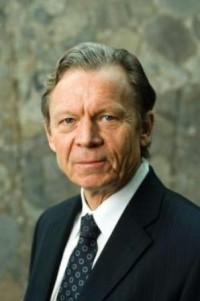Prosecutors in Norway’s corruption case against former top executives at Oslo-based Yara International have asked the court to sentence them all to up to seven years in prison, including six years for Yara’s longtime founding CEO Thorleif Enger. The request came after closing arguments this week in the biggest corruption case in Norwegian history.

Newspaper Dagens Næringsliv (DN) reported that prosecutors are also seeking relatively lengthy prison terms for three executive vice presidents at Yara during Enger’s time as CEO: Seven years for Ken Wallace, six years for Daniel Clauw and three years for Tor Holba. Yara itself has already paid a huge fine and thus avoided being part of the corruption trial.
The four men who collectively ran Yara after it was spun off from industrial firm Norsk Hydro have all denied guilt in the case. It charges them with having paid out a total of USD 2.5 million in alleged bribes in Libya and India, where Yara was keen to set up new business ventures. Prosecutors noted that a total of USD 7.5 million had been involved in agreements that Norway’s economic crimes unit Økokrim contend were designed to win favour for Yara from Libyan and Indian officials.
“No one in their right mind would have entered into such an agreement (in Libya) … if there wasn’t a hope that it would get them in with (Libya’s former oil minister),” claimed prosecutor Bård Thorsen on Monday. He claimed that the trial that began on January 5 has proven beyond a reasonable doubt that the agreements involved serious corruption.
Enger has claimed he was unaware of the deal Wallace cut with the son of Libya’s former oil minister. Prosecutors disagree. Enger was CEO at the time and Holba headed Yara’s effort to set up a fertilizer plant in Libya, they note. Wallace would have had no personal interest in setting up such a deal on his own, they argued. Wallace would never have become involved in the project, argued the prosecution, or entered into deals that exposed Yara to major losses of reputation and money if he hadn’t been asked or instructed to do so and had that cleared at the highest levels of the company. The at least tacit approval from Enger, they claim, is what makes the Yara corruption case unique in Norwegian history. There are no indications that Wallace went behind Enger’s back, and Enger has never expressed outrage over the suspicious and consulting agreements, according to prosecutors.
They claim Enger was fully aware of the agreements that Wallace and Clauw were arranging with the sons of officials in both Libya and India. They cited as evidence Wallace’s initial answers to police questioning in 2012, when he expressed little doubt himself that his negotiations on behalf of new operations in Libya and India were anchored at the very top of the company.
Although Wallace later testified differently in court, in what prosectors called a “remarkable” display of loyalty, he’d told police that Enger and Holba tried to keep themselves unaware of how his and Clauw’s work for the company was unfolding. Both were also paid well, with Clauw reportedly earning more than Enger. Wallace has been quoted as saying that Enger especially “didn’t want to know” how he was working on so-called “consulting agreements” that would pay millions to the sons of men who could help Yara achieve its business goals in Libya and India. In taped telephone conversations after he underwent police questioning, Wallace is heard saying it was untrue that Holba didn’t know about payments made to the son of Libya’s former oil minister. It was Holba’s project, prosecutors argued. It was a case of “go and do this, but don’t talk about it with me,” prosecutor Marianne Djupesland stated in court on Tuesday, referring to transcripts from Wallace’s police questioning.
Djupesland also argued there’s “no doubt” that Norwegians Enger and Holba not only knew about the alleged bribes but allowed Wallace, an American citizen, and Clauw, who lives in France, to do the difficult “spadework” in the case. She also said in court that Wallace, in another taped phone conversation, said he was willing to “stick to the story,” as long as he didn’t get the full blame.
Defense attorneys had no immediate comment on the prosecution’s closing arguments, nor did any of the four defendants have any comment on the prison terms they face. The attorney for Wallace, though, later demanded his acquittal as he held his own closing arguments. Defense attorney Arild Dyngeland claimed the prosecution had not presented enough hard evidence for a conviction and chose to ignore Wallace’s actual court testimony, relying on his earlier version of events under police questioning.
The defense attorney for Enger, Ellen Holager Andenæs, is due to conduct her closing arguments next week. The court’s verdict will be handed down thereafter.
newsinenglish.no/Nina Berglund

